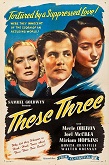These Three

Starring: Miriam Hopkins, Merle Oberon, Joel McCrea, Catherine Doucet, Alma Kruger, Bonita Granville, Marcia Mae Jones, Carmencita Johnson, Walter Brennan
Directed by: William Wyler
Rating: Passed
Genre: Drama, Romance
1936
Times Seen:
Tim: 1
Summary: Two young women (Miriam Hopkins, Merle Oberon) start a school for girls, but run into trouble when one of their troublesome girls (Bonita Granville) begins spreading lies about them.
Review:
Tim: These Three is a perfectly serviceable romantic drama, but there's very little here to get excited about. The movie is fairly entertaining, but forgettable. Much like its title (which is one of the most bland I've ever seen), the movie kind of goes through the motions, delivers a fine result, but is devoid of any real inspiration. I'm a big William Wyler fan, but this is definitely one of his smaller and more forgettable efforts.
The story itself isn't bad, but it feels very dated, a product of its times. The drama all comes from whispers, reputation, losing honor in the face of society. It seems a bit quaint by today's standards, so it helps to remember back in the 1930s, rumors could destroy a life much easier than today. The story does all feel a bit melodramatic, though. Some of the events feel a bit too illogical and the resolutions convenient. I followed the story, but it was hard to take it too seriously. It felt like the script stretched our credulity a bit too much and the characters seemed to react a little too strongly to the events on screen- and I mean the adults (the schoolgirl screams and melodrama were a whole different beast, but at least felt as believable as they were annoying). The story feels like it's trying to be too many different things. It spends a lot of time on the romance angle, but then the movie shifts into full drama mode, as we see the impact of salacious rumors on these women's lives. It feels like that is the story the movie really wants to tell. Then, it swings back to the romantic side towards the end. Wyler tries to balance both sides of this movie, but they don't feel even. It feels like the movie is much more interested in the romance at first, loses interest in that, dives into the drama, then halfheartedly returns to romance. It gives the film a weird sensation as you watch. It doesn't feel like Wyler pulled these threads together as seamlessly as they needed to be.
I loved the premise of the two main characters being women. We didn't get enough of those kind of films in the 1930s. I thought Miriam Hopkins and Merle Oberon generally did a good job. I enjoyed the scenes where they interacted about their hopes and dreams, their focus on the school. I wish the movie had more of those. The introduction of a romantic interest in Joel McCrea happens too quickly. We don't get enough time with the women by themselves, and, typical of the 1930s, both women are defined by their relationship to the man. This was common in films back then, but it felt a bit more egregious in this film. It's too bad, because Hopkins and Oberon are both talented actresses giving good performances. I wish we had more time with them. The movie seems more interested in McCrea and Catherine Doucet's memorable supporting character, then the shift focuses to Bonita Granville and Alma Kruger. It feels like Hopkins and Oberon become supporting characters in their own story, which hurts the film. I wish they were more prominently featured, because they are solid.
This is definitely a case of the supporting characters outshining the leads, though. Some of this is the fault of the direction, but to be fair, neither Hopkins nor Oberon really demand the audience's attention. Now, I'm a big fan of Joel McCrea and he can't help but take space on screen. The camera seems more interested in him than Hopkins or Oberon whenever he's on screen. He gives a really strong performance, he's likable, interesting, entertaining. Catherine Doucet felt like a scene-stealer every chance she got. Her character was so annoying, but it perfectly encapsulates so many women, she grated on our nerves, even as we marveled at the authenticity of her performance. She pulls our attention away from Hopkins and Oberon whenever she's on screen. The same happens with Bonita Granville- her performance is so energetic, so over-the-top that we can't help but look at her. Hopkins and Oberon seem a bit dull in comparison. The young Granville scored the film's only Academy Award nomination- for Best Supporting Actress. It's a bit surprising because she is so young, but her manipulative, awful character emerges as the most memorable of the film. It's a deserved recognition of an actress shaping the whole film with her challenging, impactful performance. Marcia Mae Jones adds a nice supporting performance, and it was great fun to see Walter Brennan in a small, easily overlooked comedic turn. As a whole, though, it does feel strange that Hopkins and Oberon aren't the most interesting characters in a film that really should have been theirs.
These Three (man, that title kills me) is never a bad movie, but it feels uninspired. It tells its romantic drama story in a perfectly acceptable manner. There's some definitely strengths throughout the film that help you overlook some of its flaws. It does have a nice message about the truth vs. unfounded rumors, which was probably powerful for audiences in 1936. However, in a decade where so many classic films and so many thoroughly enjoyable ones were crafted, this one falls below those thresholds. It's good, but mostly unremarkable.
Rating 1-10
Tim's Rating: 7
If You Enjoyed This Movie, We Recommend: Come and Get It, The Heiress, Sullivan's Travels
